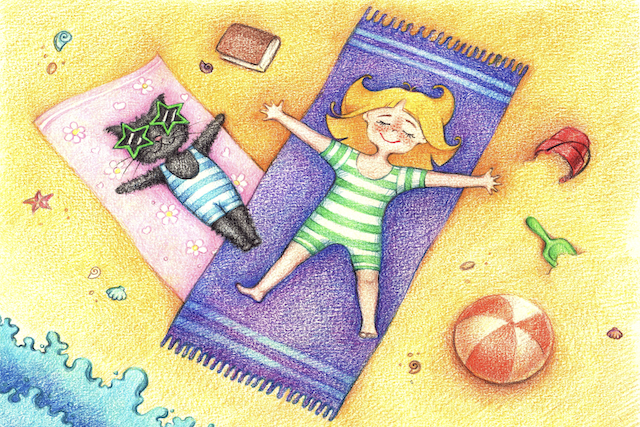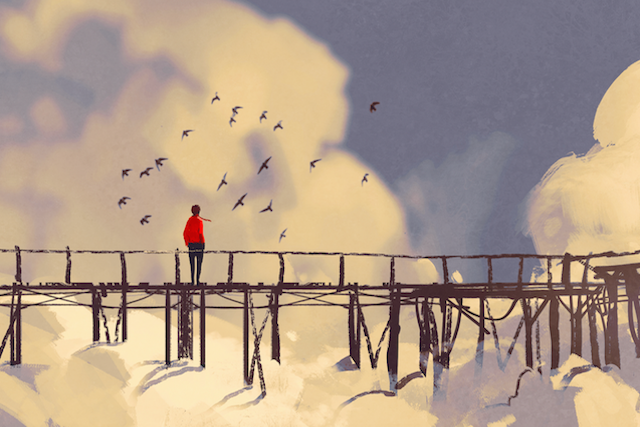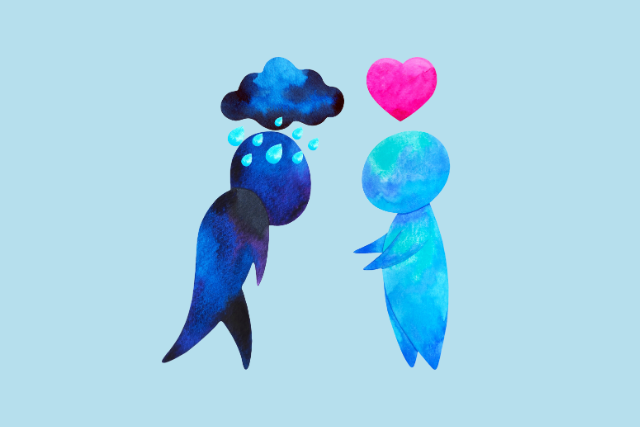
“The opposite of belonging is not isolation—it’s fitting in.” ~Brené Brown
One of my earliest memories comes from kindergarten.
My mom had bought me a new pair of navy-blue corduroy pants for an event at school. We didn’t get new clothes often, so this felt important. But what stayed with me wasn’t the pants themselves or the event—it was the way I felt wearing them.
I remember standing there, already tense, afraid that the other kids would think I looked stupid. Afraid they wouldn’t want to play with me. Afraid that being different, even in something small, would mean I didn’t belong.
I didn’t have words for it back then, but the feeling was clear: if I stood out, something was wrong with me. And if something was wrong with me, I wasn’t good enough.
That feeling has followed me quietly into everything since.
As I grew up, I never knew who I wasn’t good enough for or what standard I was supposed to meet to finally earn my place. So instead of questioning the feeling, I tried to solve it.
I tried becoming the funny guy in school. That earned laughs but also trouble with teachers. Then I shifted toward being popular—obsessing over my appearance, my energy, how I came across. Later, I became the bodybuilder who didn’t care about anything except the gym. After that, the lone wolf with perfect routines, perfect grades, a perfect body, and a life that looked disciplined and impressive from the outside.
Each version of me felt like a serious attempt. Each one came with hope that this would finally be the thing that made me feel okay. None of them did.
Every identity worked for a while, until it didn’t. The effort of maintaining something that wasn’t truly me grew heavier over time. And when it became too much, the whole thing would collapse.
After each collapse, I’d numb myself. In the early years, it was food. By my teens, alcohol and drugs joined in. The feeling underneath—this sense of not being allowed to simply exist—was crushing.
The irony was that the more I tried to escape the feeling, the worse it became. Each new version of myself had to be more extreme, more convincing, more airtight than the last. And each collapse hit harder.
Eventually, I started to believe that the problem wasn’t what I was doing—it was who I was. That no matter how hard I tried, I would always come up short. That maybe some people were simply not built to be good enough.
I tried to get help. Therapists helped me understand where the feeling might have come from: losing my dad early, being bullied, unstable circumstances growing up. Their explanations made sense. They gave me things to try.
But even with that understanding, the feeling didn’t change. I still felt empty. Still felt like I was failing some invisible test. Insight explained the pain, but it didn’t loosen its grip.
In my mid-twenties, I met my girlfriend. In the beginning, I felt lighter and more secure. For a while, the feeling of not being good enough faded into the background. Then I started to really love her.
And with that love came a familiar fear. I became terrified that she would see who I really was and leave. That she’d realize I was a fraud. That this relationship would become just another entry on a long list of proof that I wasn’t worth staying for.
That fear seeped into everything. My studies suffered. My work felt heavy. I held on to the few anchors I still had—eating relatively well, staying active—because they gave me something solid to cling to.
Then we moved to Thailand.
The move was exciting on the surface, but underneath it, I was exhausted. I didn’t admit it to myself at the time, but I had been pretending for a long time—pretending I could handle the stress, the uncertainty, the pressure to keep functioning.
Once we arrived, something in me gave out.
Without consciously deciding to, I let go of the last routines that had kept me stable. The feeling of not being good enough came on stronger and faster than ever. Within weeks, I was convinced my girlfriend would leave the moment she met someone better, which felt like almost anyone. I was certain my work would discover I didn’t belong in my role and replace me with someone who actually deserved it.
Over time, that fear became my new normal.
I stopped wanting to do anything. Thinking felt hard. Getting out of bed felt impossible. People around me grew frustrated, watching me withdraw and waste time. From the outside, it probably looked like laziness or lack of discipline.
From the inside, I was using everything I had just to keep pretending I didn’t know what I believed about myself. I stayed like that for almost a year.
Then I went home for a short vacation.
One day, sitting alone, I looked back at the year I’d just lived. And something finally became impossible to ignore. Almost every decision I had made—my job, where I lived, the way I spent my time—had been made for someone else. Not a specific person, but an imagined audience. A version of life that looked acceptable. Respectable. Safe.
I hadn’t chosen those things because I wanted them. I’d chosen them because I thought they proved I was worthy of existing.
As I sat with that, I started seeing the same pattern everywhere. Growing up, I’d stayed friends with people I didn’t really like. I’d dated people I wasn’t truly aligned with. I’d studied and worked in fields that never felt right. Even the way I treated people was shaped by who I thought I needed to be, not who I was.
I remembered something small from childhood: I used to love reptiles. I even had snakes. But once I learned that people thought kids with snakes were weird, I sold them. Not long after, I became afraid of snakes myself.
That was the pattern. Again and again, I gave up pieces of myself in exchange for approval. And every time I did, the feeling of not being good enough tightened its grip.
What slowly became clear was this: the feeling might have been born from loss and difficulty, but I was the one keeping it alive. By constantly trying to live up to what I thought others wanted, I never lived in a way I could respect myself.
I started to see that I wasn’t failing because I was incapable, but because I kept shaping my life around being approved of. I didn’t suddenly feel better after realizing this. Nothing was cured. But something shifted.
I started making changes that didn’t look impressive from the outside. I left a job I hated. I went back to working on something that actually mattered to me. I returned to taking care of my health—not to perfect myself, but to give my days structure and enjoyment again.
A lot of people disapproved. I earned less. My choices looked risky. I was encouraged to take a more traditional path.
But for the first time, my life started to feel like mine.
The feeling of not being good enough didn’t disappear. It still shows up. Sometimes as anxiety. Sometimes as panic. But it no longer runs my life. It’s moved from being the driver to being background noise.
I can sleep at night. I look forward to waking up. And when I’m unsure about a decision, I no longer ask whether it will make me look acceptable. I ask whether it moves me toward a life I can stand behind—and who I’m really doing it for.
For a long time, my biggest fear was that I wasn’t good enough. Now, my biggest fear is living a life that isn’t mine.
![]()
About Paul Hagen
Paul Hagen writes about personal growth, direction, and building a life that’s aligned with what actually matters. Through his work at Hagen Growth, he explores sustainable ways of changing how we live, work, and make decisions - without shaping our lives around approval. You can find more of his writing at hagengrowth.com.
Get in the conversation! Click here to leave a comment on the site.
from Tiny Buddha https://ift.tt/mQ9RM5P







 , a method he’s practiced for over fifteen years to help high-performing professionals release chronic stress and insecurities rooted in generational and early life imprints. His work supports a return to clarity, emotional stability, and grounded inner power. Paul offers live workshops, online classes, and personalized sessions. Learn more at
, a method he’s practiced for over fifteen years to help high-performing professionals release chronic stress and insecurities rooted in generational and early life imprints. His work supports a return to clarity, emotional stability, and grounded inner power. Paul offers live workshops, online classes, and personalized sessions. Learn more at
